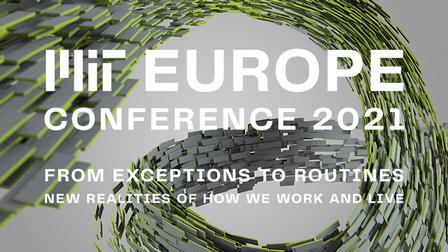
MIT Europe Conference 2021 - Gesamte Konferenz als Nachschau verfügbar
Technologiekonferenz unter dem Titel "New Realities of How We Work & Live"
Lesedauer: 2 Minuten
Am 24. März 2021 lud die Wirtschaftskammer Österreich (WKÖ) zur MIT Europe Conference 2021, eine der bedeutendsten Technologiekonferenzen Europas, die im 2-Jahres-Rhythmus gemeinsam mit dem Massachusetts Institute of Technology (MIT) stattfindet. Unter dem Titel „From Exceptions to Routines - New Realities of How We Work & Live“ präsentierten SpitzenforscherInnen des MIT die neuesten Forschungsergebnisse und Innovationen aus ihren Fachgebieten. Dabei gaben die ForscherInnen der Elite-Universität visionäre Einblicke in Trends und Entwicklungen unserer zukünftigen Welt des Arbeitens und Lebens.
Talks und Panels als Nachschau
Präsident Harald Mahrer gab einen Einblick in bahnbrechende Innovationen und die Welt von morgen: Hier der Innovation Talk zum Nachschauen. MIT-ExpertInnen wie David Autor (T Department of Economics), Julie Shah (MIT Interactive Robotics Group), Deb Roy (MIT Media Lab) und Sanjay Sarma (MIT Office of Digital Learning) beantworteten Zukunftsfragen und in der Diskussionsrunde sprachen der aus Boston zugeschaltete Andrew McAfee (MIT Initiative on the Digital Economy), die österreichischen ExpertInnen und UnternehmerInnen Dorothee Ritz (Microsoft Österreich) und Hubert Rhomberg (Rhomberg Holding) sowie WKÖ-Präsident Harald Mahrer über die Zukunft einer digitalen Arbeitswelt.
WELCOME AND INNOVATION TALK
- Harald Mahrer, President, Austrian Federal Economic Chamber
THE NATURE OF WORK AFTER THE COVID CRISIS: TOO FEW LOW-WAGE JOBS
- David Autor, Ford Professor and Associate Head, MIT Department of Economics
What will the recovery from the global spike in unemployment look like? How will newly implemented technologies impact this process?
WHAT TO EXPECT WHEN YOU'RE EXPECTING ROBOTS
- Julie Shah, Associated Professor, Department of Aeronautics and Astronautics. Head of the Interactive Robotics Group. MIT Computer Science and Artificial Intelligence Lab (CSAIL)
How will society adapt to a public sphere, where interactions with robots will become a part of everyday life?
PANEL DISCUSSION:
HUMANS VERSUS MACHINES | THE SECOND MACHINE AGE
AND THE NEXT BIG THING
- Harald Mahrer, President, Austrian Federal Economic Chamber
- Andrew McAfee, Co-Director, MIT Initiative on the Digital Economy
- Dorothee Ritz, General Manager, Microsoft Austria
- Hubert Rhomberg, Managing Director of Rhomberg Holding GmbH
- Claudia Unterweger, Moderator
APPLYING NEW EDUCATION TECHNOLOGIES TO MEET WORKFORCE EDUCATION NEED
- Sanjay Sarma, Vice President for Open Learning. Fred Fort Flowers (1941) and Daniel Fort Flowers (1941) Professor of Mechanical Engineering
How can learning science and new technologies help to address current educational system issues, such as underinvestment and a deep disconnect between the worlds of work and learning?
THE GLOBAL FUTURES OF CREATIVE WORK AND CITIES
- Katja Schechtner, Research Fellow, MIT Senseable City Lab and Advisor to the Austrian Minister of Climate Action, Environment, Energy, Mobility, Technology and Innovation
- Georg Russegger, Knowledge Transfer Centre, Academy of Fine Arts Vienna
- Mary Anne Ocampo, Lecturer of Urban Design, Department of Urban Studies and Planning, MIT. Principal, Sasaki
COGNITIVE SCIENCE AS A NEW PEOPLE SCIENCE FOR THE FUTURE OF WORK
- John Gabrieli, Grover Hermann Professor, Health Sciences and Technology. Professor Brain and Cognitive Sciences
How can the foundations of a new people science provide a better understanding of the increasingly relevant job hiring aspects, such as the overall fit to the job and soft skills of applicants?
CONSTRUCTIVE COMMUNICATION IN THE AGE OF FRAGMENTATION
- Deb Roy, Professor of Media Arts and Sciences. Director MIT Center for Constructive Communication. Executive Director, MIT Media Lab
Can new tools and communication networks be the answer to the globally growing social, cultural and political divides?